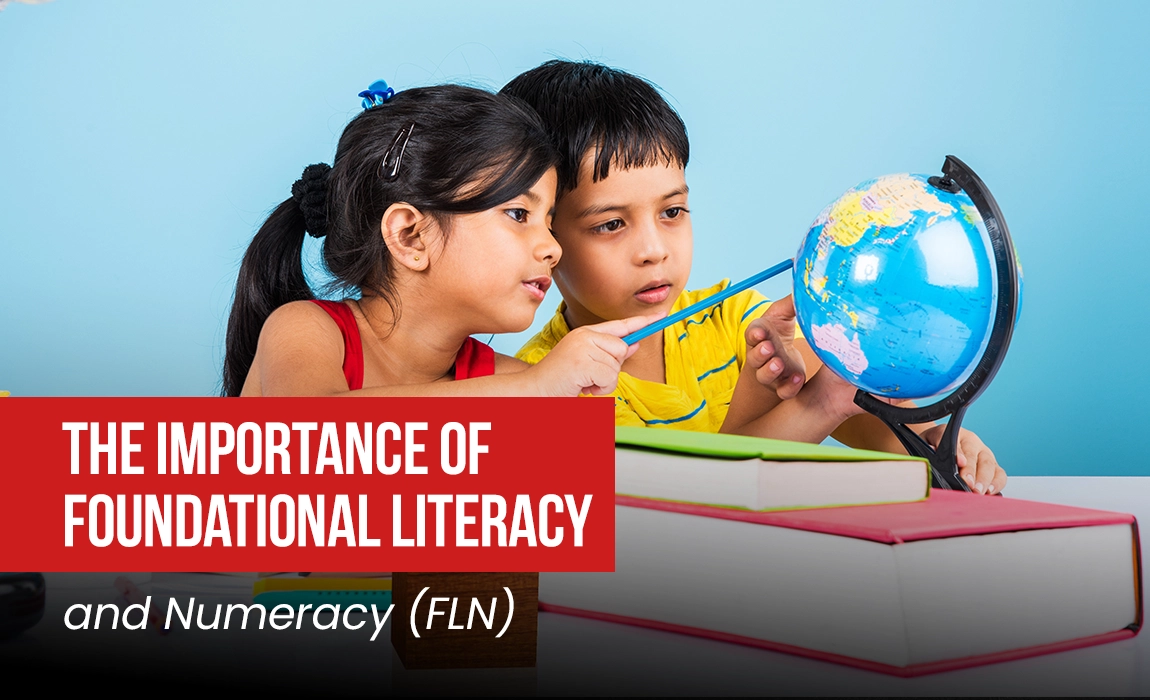In today’s fast-paced AI-driven world, educational landscapes are ever-evolving, making it important to enhance the learning experience of students. This is why Foundational Literacy and Numeracy (FLN) have become the cornerstone of primary education in India.
In such ever-evolving times of the education system, tools like FLN equip children with the ability to read with understanding and solve basic mathematical problems by the end of Grade 3. This is why schools like Rainbow International School or those of both the important boards, CBSE and ICSE, have prioritised FLN in their early education frameworks, leading to a strong academic foundation in early stages of education that paves the way for lifelong learning and success.
In this blog, we will explore why FLN is critical, how it supports cognitive development, and why it should be a key focus in primary education across CBSE and ICSE schools.

But before we begin, let us first understand:
What is Foundational Literacy and Numeracy (FLN)?
In simple terms, Foundational Literacy is the introduction of basic skills such as reading, writing and mathematics to children, which are required in day-to-day life. These skills are much needed for the development of children by the end of grade 3. It is a strong foundation for future academic learning of the students and must for academic success.
FLN focuses on children’s ability to read and understand the basics of language and mathematical calculations that they will apply in life slowly and gradually.
These skills form the backbone of a child’s learning journey, and hence, it is an unavoidable educational method of learning. Without mastery in these areas, students struggle to keep up with more advanced subjects like science, social studies, or even languages as they progress through school.
Why FLN Matters in CBSE and ICSE Schools
As we all know, CBSE and ICSE are two prominent boards of India, which are known for their rigorous curricula. These boards focus on and emphasise academic excellence. This makes it even more important for students to have a strong foundation in the primary years of education to survive in the higher classes. This is why both boards have recognised that without strong FLN skills at the primary level, students face long-term learning difficulties, leading to:
- Learning gaps in higher classes
- Lack of confidence in academic performance
- Reduced participation in classroom activities
- Lower overall academic achievement
The Role of FLN in Cognitive Development
As discussed above, FLN helps in building an educational foundation that starts from the early stages of learning for every child. The more you focus on the foundation, the more easily they will excel in the higher years of education. One of the most profound benefits of foundational literacy and numeracy is its impact on a child’s cognitive development.
Cognitive development is a child’s ability to understand anything taught to him/her. Research shows that early reading and numeracy skills are closely linked to brain development, particularly in areas related to language processing, memory, problem-solving, and critical thinking.
Here’s how FLN supports cognitive growth:
- Language Development: Reading stories and understanding instructions help children develop vocabulary, grammar, and communication skills.
- Numerical Reasoning: Counting, sorting, and recognizing patterns build logical reasoning and early mathematical thinking.
- Memory and Attention: Recalling words, phrases, numbers, and sequences sharpens working memory and enhances focus.
- Analytical Thinking: Applying literacy and numeracy to real-world contexts promotes decision-making and analytical abilities.
Thus, FLN goes beyond just academic success it shapes how children think, reason, and interact with the world.
Key FLN Strategies in CBSE and ICSE Classrooms
Where there is skill learning, there has to be a strategy and plan and to be honest FLN itself is a strategy that has to be implemented and applied well in the curriculum. Schools under both CBSE and ICSE boards implement several strategies to strengthen FLN in primary grades. Some effective practices include:
- Activity-based Learning: In this type of learning children enjoy the learning processes making it more than monotonous education. It is includes using games, puzzles, storytelling, and hands-on activities to make learning engaging and interactive.
- Phonics and Word Recognition: This is one of the most interactive and fun learning method where children thoroughly enjoy and get trained in very innovative and happening way. This includes teaching children to decode words phonetically, helping them read independently. This helps them remember poems and words.
- Mathematical Manipulatives: In this method of learning, children get acquainted with various shapes, sizes, colors and more importantly, numbers through fun learning activities. This type of learning includes using tools like blocks, beads, and number lines to explain basic math concepts visually.
- Reading Aloud and Shared Reading: Reading is very important from the very beginning of childhood. It helps them understand what is written and makes them used to learning through books and reading. Encouraging group reading sessions to build fluency, comprehension, and listening skills is one of the way of implementing reading into children’s routine.
- Regular Assessments: This is very important for parents because they get to know how their kids are performing, which area of learning they are good at and helps them to know where they lack. Tracking student progress with simple assessments to identify learning gaps early and provide remedial support is where the schools contribute for every child who needs more practice.
- Teacher Training: Training teachers is also one of the important techniques implemented to put across the need of today’s education in front of teachers. This helps schools to stay updated with the methods of teaching to be used in classrooms especially at formative level. This means equipping teachers with updated pedagogical methods to deliver FLN content effectively.
FLN as a Foundation for Academic Success
When students achieve mastery in foundational literacy and numeracy, they are better prepared for the academic demands of middle and senior school. Here’s how FLN contributes to long-term academic success:
- Smooth Transition to Complex Subjects: Students who can read instructions and understand math concepts are more capable of handling subjects like science, geography, and even second languages.
- Improved Classroom Engagement: Confident learners are more likely to participate in discussions, ask questions, and explore new ideas.
- Higher Performance in Board Exams: A strong foundation reduces exam anxiety and improves performance in later grades, including board exams.
- Lifelong Learning Skills: Early proficiency in literacy and numeracy creates habits of independent learning, setting the stage for success in higher education and beyond.
In short, FLN is not just a Phase 1 milestone; it’s the launchpad for holistic academic achievement.
The Government’s Push for FLN in Schools
The growing importance of FLN and its need in education system has also been noted by the Government of India. To acknowledge the same the government has launched like NIPUN Bharat (National Initiative for Proficiency in Reading with Understanding and Numeracy) to empower schools, teachers, and parents.
Both CBSE and ICSE schools are aligning their early education practices with national FLN goals to ensure no child is left behind.
How Parents Can Support FLN at Home
It is often considered that sending children to school is enough to educate them. Many times, busy parents tend to ignore the study of their children. But it is necessary for every parent to help their children in studies starting from their early years of education. Parents must equally contribute to building the foundational skills of their students. Here are some tips for parents:
- Read Daily: Parents must spend time reading stories, newspapers, or even labels with children to nurture a love for reading in them.
- Make Math Fun: Involve children in simple math activities like counting change, measuring ingredients, or playing board games.
- Encourage Questions: Support your child’s curiosity by answering their questions and helping them explore new topics.
- Create a Learning Environment: Provide access to books, puzzles, and educational toys at home.
Thus, to build a strong foundation for every child, their parents must also contribute to the learning needs of the student by being attentive, interactive and motivating towards them. This interaction between children and their parents gives transformative results.
Conclusion: Why FLN Must Remain a Priority
One of the important and government-recognised means of education, foundational literacy and numeracy, must be considered by every school, parents and teachers while educating children. This helps ensure that the children don’t just memorise facts but develop the ability to learn, think and thrive.
One of the important and government-recognised means of education also incorporated by Rainbow International School the Foundation literacy and numeracy is much needed for every school, parents and teachers while educating children. This helps ensure that the children don’t just memorise facts but develop the ability to learn, think and thrive.
When the education system is built on such a strong foundation, every kid will enjoy learning patterns without complaint and will excel in ways unimaginable. Giving your child an FLN-inspired education is going to be one of the best decisions in shaping their future.
In today’s world, education systems are no more a stringent practice followed year after year blindly. It is evolving and ever-changing to be more student-centric, which makes learning more flexible, dedicated and enjoyable. As the education system evolves, FLN must remain at the heart of India’s vision for equitable, quality education for all.
Frequently Asked Questions
Foundational Literacy refers to the ability to read, write, and comprehend texts, while Foundational Numeracy involves understanding numbers and performing basic arithmetic. Together, they are key skills students must master in the early grades.
FLN forms the foundation for all future learning. In CBSE and ICSE schools, it helps students gain essential skills in reading, writing, and mathematics, which are crucial for their academic success in higher grades.
FLN supports cognitive development by enhancing memory, attention, problem-solving, and logical thinking. Mastering these skills at an early age boosts a child’s ability to process information and think critically.
Schools use a variety of methods such as activity-based learning, phonics, mathematical manipulatives, and regular assessments to strengthen FLN. These strategies make learning interactive and engaging for students.
Parents can support FLN by reading daily with their children, involving them in simple math activities, answering their questions, and creating a learning-friendly environment at home.

